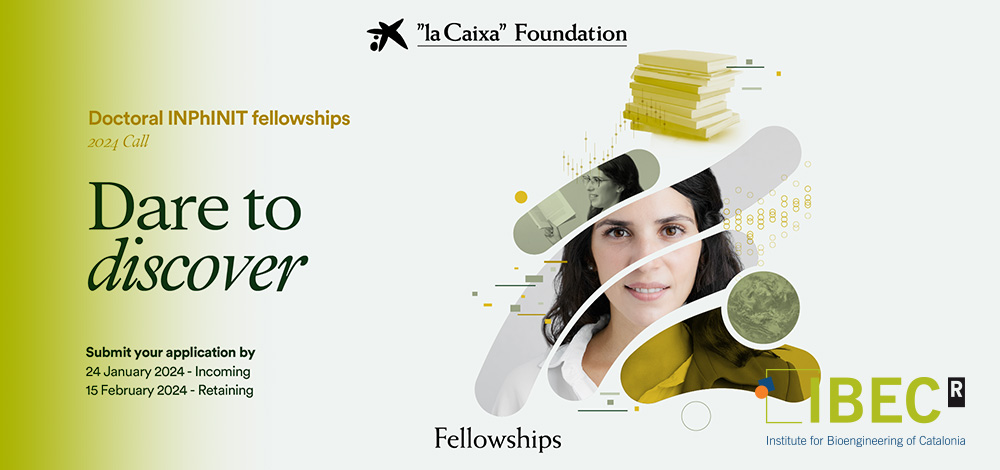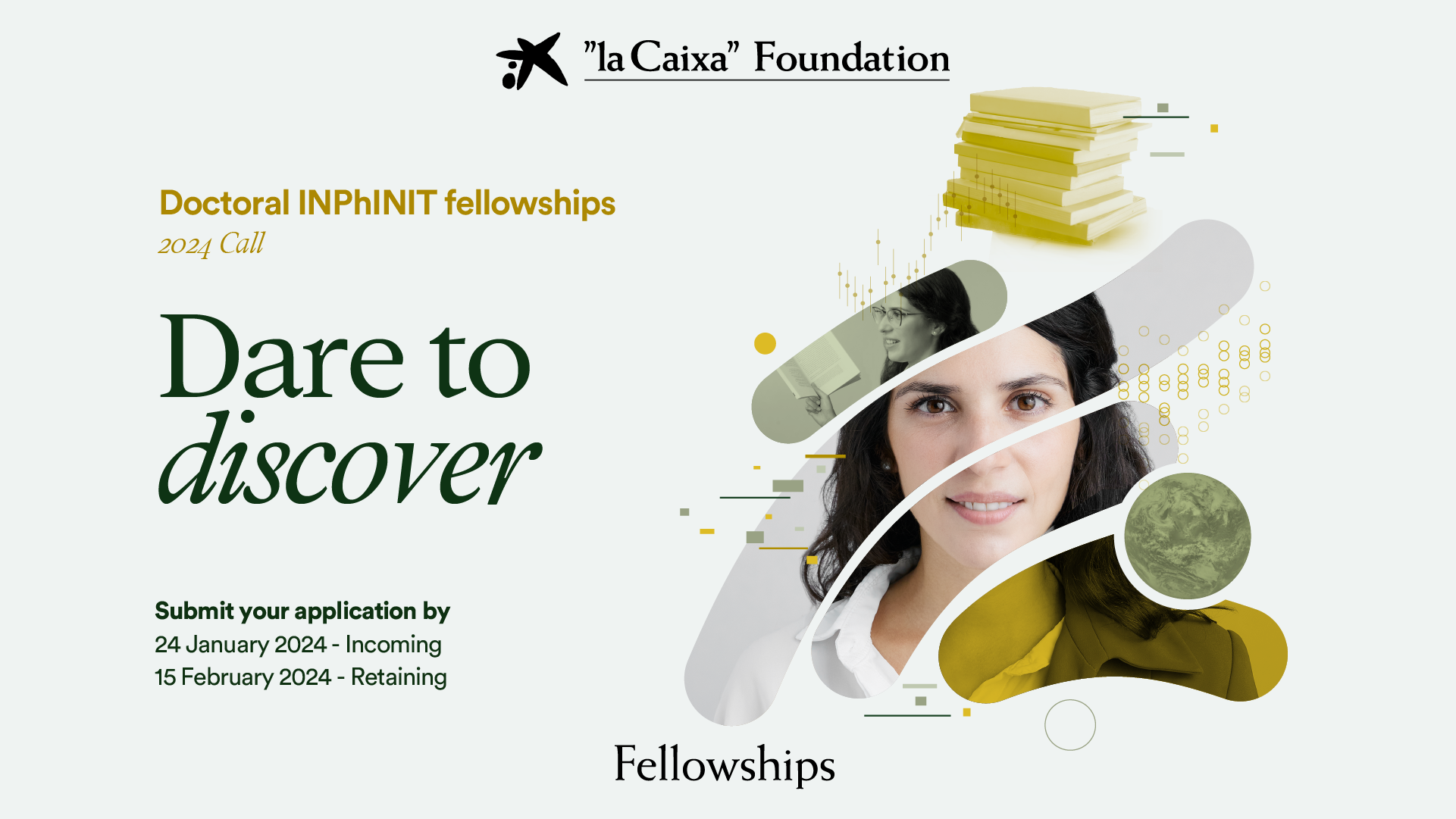Open for applications

ABOUT
INPhINIT, ”la Caixa” Doctoral Fellowship Programme is devoted to attracting international Early-Stage Researchers to the top Spanish research centres in the areas of Bio and Health Sciences, Physics, Technology, Engineering and Mathematics.
”la Caixa” Banking Foundation, which firmly believes that scientific progress, research, mobility and professional qualification are key to the development of society, is launching a doctoral fellowship programme for researchers of any nationality at any university or research centre in Spain or Portugal.
”la Caixa” Banking Foundation is offering 30 fellowships to take up official doctoral studies at any university or research centre in Spain or Portugal.
The call for applications covers all areas of knowledge and is aimed at individuals who fulfil the requirements to be admitted into a doctoral degree programme, provided that they also fulfil the mobility requirements and that they have not previously enrolled in the doctoral studies applied for.
| IBEC is one of the top research institutions named as a Severo Ochoa Research Centre by the Ministry of Economy and Competitiveness (in charge of research and innovation policy in Spain), which recognizes excellence at the highest international level in terms of research, training, human resources, outreach and technology transfer. IBEC has also received the ‘Human Resources Excellence in Research’ seal from the European Commission, in recognition of its commitment to continuously improving its HR policies in line with The European Charter of Researchers and The Code of Conduct for the Recruitment of Researchers. IBEC aims to train the next generation of researchers in bioengineering for future medicine, regenerative therapies and active ageing. Thanks to IBEC’s interdisciplinarity, the most recent technical and technological approaches developed for research in biology and the biomedical sciences are available. Young researchers can acquire experience and practical training day-to-day in both the classical approaches and new methodologies in imaging techniques, nanomaterials technology, nanofabrication, biosensors, biosignal interpretation, lab-on-a-chip approaches, and many more. |
| ”la Caixa” is a non-profit entity whose activity in education is based on the principle of promoting equal access of citizens to quality qualifications and specializations at national and international levels. Over the years, thousands of students have advanced their training thanks to a ”la Caixa” Foundation fellowship, enabling them to undertake postgraduate studies in Spain and abroad. |
IBEC GROUPS
IBEC groups
Each call will be directly launched by Obra Social “la Caixa”, who will be in charge of managing the selection process of the candidates. On the other hand the candidates, once granted a fellowship, will propose the center and research group that they would like to join, and with which they have previously had contact, to work on a research proposal agreed with the center.
Please feel free to contact our group leaders. They will be happy to answer your questions.
| Group: Biomaterials for neural regeneration Group leader: Zaida Álvarez (Samuel Stupp) (zalvarez@ibecbarcelona.eu |
| Group: Physical Biology and Molecular Bionics Group leader: Giuseppe Battaglia (gbattaglia@ibecbarcelona.eu) |
| Group: Protein phase transitions in health and disease Group leader: Benedetta Bolognesi (bbolognesi@ibecbarcelona.eu) |
| Group: Biomaterials for regenerative therapies Group leader: Elisabeth Engel (eengel@ibecbarcelona.eu) |
| Group: Nanomalaria Group leader: Xavier Fernández Busquets (xfernandez@ibecbarcelona.eu) |
| Group: Nanoscale bioelectrical characterization Group leader: Gabriel Gomila (ggomila@ibecbarcelona.eu) |
| Group: Nanoprobes and nanoswitches Group leader: Pau Gorostiza (pgorostiza@ibecbarcelona.eu) |
| Group: Biomedical signal processing and interpretation Group leader: Raimón Jané (rjane@ibecbarcelona.eu) |
| Group: Molecular Imaging for Precision Medicine Group leader: Irene Marco-Rius (imarco@ibecbarcelona.eu) |
| Group: Signal and information processing for sensing systems Group leader: Santi Marco (smarco@ibecbarcelona.eu) |
| Group: Biomimetic systems for cell engineering Group leader: Elena Martínez (emartinez@ibecbarcelona.eu) |
| Group: Pluripotency for organ regeneration Group leader: Núria Montserrat (nmontserrat@ibecbarcelona.eu) |
| Group: Targeted therapeutics and nanodevices Group leader: Silvia Muro (smuro@ibecbarcelona.eu) |
| Group: Biosensors for bioengineering Group leader: Javier Ramón (jramon@ibecbarcelona.eu) |
| Group: Molecular and cellular neurobiotechnology Group leader: José Antonio del Rio (jadelrio@ibecbarcelona.eu) |
| Group: Cellular and molecular mechanobiology Group leader: Pere Roca-Cusachs (proca@ibecbarcelona.eu) |
| Group: Bioinspired Interactive Materials and Protocellular Systems Group leader: César Rodriguez-Emmenegger (crodriguez@ibecbarcelona.eu) |
| Group: Nanobioengineering Group leader: Josep Samitier (jsamitier@ibecbarcelona.eu) |
| Group: Smart nano-bio-devices Group leader: Samuel Sánchez (ssanchez@ibecbarcelona.eu) |
| Group: Bacterial infections: antimicrobial therapies Group leader: Eduard Torrents (etorrents@ibecbarcelona.eu) |
| Group: Integrative cell and tissue dynamics Group leader: Xavier Trepat (xtrepat@ibecbarcelona.eu) |
LIFE AT IBEC
Living with us: Training, mobility and social activities
IBEC encourages its PhD students to participate in various activities, such as workshops, discussions and outreach events, in order to develop themselves as international researchers.
IBEC Seminars and PhD Discussions IBEC provides Seminars with top names in bioengineering and nanomedicine from all over the world in order to offer the opportunity to discuss and network the developments. At the same time IBEC provides PhD discussions, Training for specially devoted for PhD and early postdocs such workshops to prepare the thesis and presentation skills. IBEC also offers different courses to give the opportunity to learn new skills such a leadership communication, time management, and language skills. The institute also holds an annual symposium on a different scientific theme, as well as hosting and organizing several other project-based or general scientific meetings and workshops throughout the year. |
| Practical training Thanks to IBEC’s interdisciplinarity, the most recent technical and technological approaches developed for research in biology and the biomedical sciences are available at the institute. PhD students can acquire experience and practical training in both the classical approaches and new methodologies in imaging techniques, nanomaterials technology, nanofabrication, biosensors, biosignal interpretation, lab-on-a-chip approaches, and many more. |
| Complementary skills training Besides the mandatory doctoral courses offered by the universities, IBEC offers several training courses specifically devoted to PhD students and early postdocs, covering such topics as Scientific writing, Effective communication, Leadership, Guidance for women in their research, How to publish in high ranking journals, Preparing a PhD thesis, Presentation skills in English, Career development, Diversity and cross-cultural awareness in research, Entrepreneurship or Technology transfer. All courses in complementary and transferrable skills are designed to enhance future employability and career progress. |
| Outreach activities As part of its mission, IBEC aims to inform society about the research being carried by its scientists in bioengineering and nanomedicine, both to help citizens understand the importance of research and make informed decisions, and to encourage young people to consider scientific careers. To do this, the institute organizes or takes part in a range of outreach activities throughout the year. IBEC’s PhD students are required to volunteer for these activities, as they offer the perfect opportunity to gain experience in explaining your research in terms that a lay audience can understand, a skill that is essential for your career in areas such as achieving funding for projects. IBEC’s outreach activities include group visits from schools, universities and other organizations, one-on-one mentoring, workshops for teachers, science fairs and festivals, talks in public spaces, Open Doors days, and many more. |
| Research Placements As part of their training, young researchers are encouraged to take up research placements in other centres. Thanks to these stays, students benefit from intense transnational and multidisciplinary mobility, as well as the expertise and facilities of the best institutions worldwide. Such mobility provides them with multicultural skills, including languages, and proves highly beneficial in crossing cultural borders and enhancing their future employability in a globalised job market. Placements take place in any of the many institutions with which our researchers collaborate, including but not restricted to centres linked to IBEC by strategic research agreements or funded exchange programmes such as Marie Curie or the Networks of Excellence. These stays have the added value of enabling PhD students to obtain an international PhD, a recognised distinction which significantly improves their chances of a successful career. |
| IBEC PhD Students’ Committee The PhD Students’ Committee is a group of highly motivated representatives of different research groups at IBEC, mainly graduate students, that work voluntarily with two major aims: to be the voice of the PhD students inside the institute, and to improve the PhD experience. The Committee works jointly with IBEC’s support service units to organize workshops, courses and seminars in response to the PhD community’s needs and requests. Social and sports activities where students can relax and mingle with others, such as bowling, tennis table and beach volley, are held frequently too. The representatives of the Committee convene regularly with HR and the Directorate to organize all these activities, as well as to pass on ideas and suggestions from the young IBEC community. |
ELIGIBILITY
Eligibility
The INPhINIT programme will be open to Early-Stage Researchers (ESR) of all nationalities. In order to be accepted, candidates must meet the following eligibility requirements:
- Experience: candidates must not have carried out more than four years of research activity before the closing date of the call.
- Studies pursued: at the time of recruitment, candidates must have completed the studies that allow them to enrol in an official PhD programme in Spain/Portugal. The verification of the required level of studies will be carried out by the host university when the admission procedure begins.
Candidates must not have been enrolled in a doctoral programme prior to the start of the fellowship. - Mobility: candidates must have resided or carried out their main activity (work, studies, etc.) in Spain/Portugal for more than twelve months in the three years immediately preceding the closing date of the call.
- Level of English: candidates must accredit the required level of English by submitting one of the certificates specified in the rules for participation.
HOW TO APPLY
How to apply
You can apply for a Doctoral INPhINIT fellowship through ”la Caixa” Foundation’s fellowship application website.
If you have any further questions please contact phd@ibecbarcelona.eu.

IBEC is committed to the principles of the Code of Conduct for the Recruitment of Researchers of the European Commission. Thus, there are no restrictions of citizenship or gender and candidates with disabilities are strongly encouraged to apply.
This project has received funding from the European Union’s Horizon 2020 research and innovation programme under the Marie Sklowdowska-Curie grant agreement No. 713673
KEY DATES
Useful dates
No projects or additional documentation can be presented outside the deadlines established in the rules of the call for applications.
End: 15 February 2024, at 2 pm Peninsular Spain
Shortlisting results and call for interviews: 17 May 2024
Selection interviews: 12, 13 and 14 June 2024
Final result: 21 June 2024
If you have any further questions, or if there are particular issues you’d like to discuss regarding your potential PhD project, please contact phd@ibecbarcelona.eu
For details of the grant, applications and selection criteria process, and other general questions, please visit the INPhINIT programme website.

